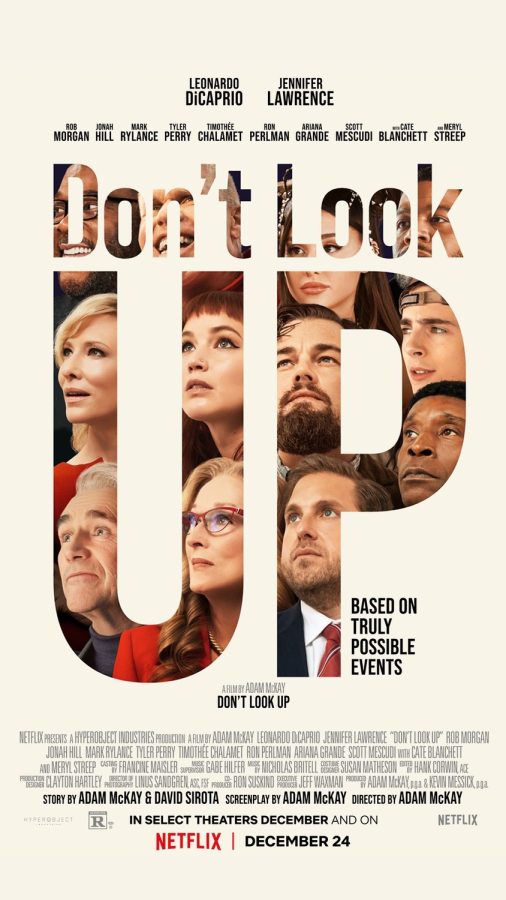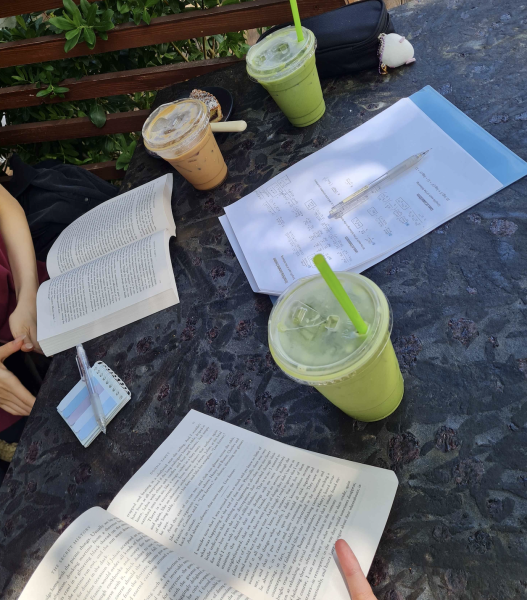Looking Down on Don’t Look Up
Early 2022, Netflix’s new blockbuster Don’t Look Up climbed the charts to become the 3rd-most viewed Netflix movie of all time.
Leonardo DiCaprio. Timothée Chalamet. Jennifer Lawrence. Meryl Streep. A two-and-a-half-hour long film that makes a striking commentary on climate change. Is this a recipe for success? According to Rotten Tomatoes’ rating of 55%, maybe not. Since its release last December, Don’t Look Up has received a share of raving reviews, but alongside many disappointed critical ones. How could a movie with such a strong cast and passionate message miss the mark so astronomically?
Critics seem to have come to a consensus that the impressive cast performed well with the content they were given. “The actors do what they can with the subpar material,” writes critic Gary M. Kramer in a review for Salon.com subtitled “Leonardo DiCaprio, J. Law & Meryl Streep can’t save Netflix’s bloated mess.” Additionally, Matthew Dennis from The Manual wrote, “The anxious and slightly pudgy Leonardo DiCaprio sets off the severe, Michigan State-sweatshirt wearing Jennifer Lawrence quite well.” The actors weren’t what brought the movie down. In fact, the recognizable cast probably drew a large portion of the audience to watch it in the first place.
The movie’s message in itself, that society is unable to come together and take action before it’s too late, is important and widely agreed upon. Chloe Shiue (‘24) had an overall negative view of the movie, while still agreeing with the message. “I think the only good part of the movie was the message behind it, and even that’s looking at it in a bright light,” she said. “I also really liked Ariana Grande’s song, though. You know someone’s a good singer when they can sing random lyrics and it still turns out nice.”
If it isn’t the message itself that caused negative pushback, we are left only with the execution of the film and the manner in which the story is told. For many critics, this is where it begins to feel difficult to pinpoint the exact reason behind their negative opinion. Perhaps it simply comes down to aggressiveness. “McKay has little trust in his audience or his characters. The film bellows its argument at us: the world is terrible, and we are doomed if we do not change,” summarized Andrew Kenall from Stabroek News in a Rotten Tomatoes review. “Few would dispute this. But a good argument isn’t enough to make a good movie.”
The movie’s relative failure likely has more to do with its overwhelming negativity. Instead of going the empowering route, Adam McKay blames everyone and everything for the problem that is humanity and leaves viewers feeling like we are all doomed. “It was a very pessimistic movie,” agreed Kenan Begovic (‘24). “It addressed many of the prevalent issues in society, but I felt like it was just yelling at us rather than proposing a solution.”
The movie is also unnecessarily long. “For a film to find glimmers of beauty amidst such bleakness is nothing if not commendable, but Don’t Look Up also doesn’t achieve this until well into its 145 minute runtime. Ironically, it may be too little too late,” remarked Siddhant Adlakha from the Observer.
Not only does the length make the blatant message more extreme, but also causes the plot to be less cohesive. “The first hour was certainly promising, but it quickly became repetitive and verbose,” Rotten-Tomato-approved critic Ruth Maramis put it. “The thing is, nobody likes to be hit over the head with anything, especially a topic so glaringly obvious.”
To me, Don’t Look Up certainly feels inconsistent in its plot. It starts out as lighthearted and funny, but towards the end, it suddenly spirals into a depressing tragedy. The runtime only makes the conclusion more disappointing: it feels as if the plot has been building up to something less predictable and bleak. Jessica Luo (‘24) agreed, saying, “After watching the movie, I was a little disappointed. At the same time, I felt like I wanted more.”
On the other hand, Don’t Look Up, has also received a large portion of positive reviews. Some felt that the aggressiveness of the message was necessary and that the ending was expected. “It was a great parody of what’s happening nowadays in society,” said Spanish teacher Mr. Gregg Luna. “I think the brilliance of the movie was being able to see yourself and society from a different angle.” Kenan added, “I liked the ending, because I think it would have been cheesy otherwise.”
“In the end, it seems that Don’t Look Up attempts to make a worthy point,” writes Dennis. “But instead of hitting the funny bone, the director smacks audiences in the face.”

Isadora is a senior and an Editor-in-Chief. A four-year member of The Tower, she loves to write about a variety of topics, from school coverage to national...







